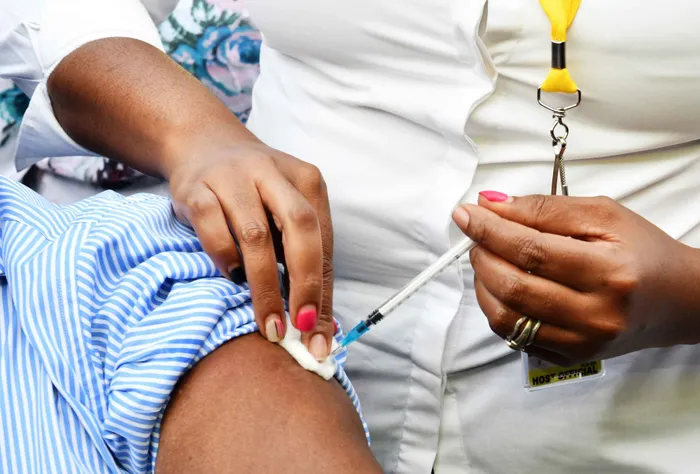Is it best to boost even when Covid-19 immunity wanes?

Picture: Jarius Mmutle/GCIS- President Cyril Ramaphosa receives a Covid-19 booster shot. Two and a half years into the pandemic, one would be hard-pressed to find a person who hasn’t had either Covid-19, received a vaccine, or a combination of both a few times over.
By Kelly-Jane Turner
Two and a half years into the pandemic, one would be hard-pressed to find a person who hasn’t had either Covid-19, received a vaccine, or a combination of both a few times over.
Some may have even found themselves in a cycle of receiving a vaccine, subsequently contracting Covid, receiving a booster and then testing positive for the Omicron variant.
This raises the question of the necessity to vaccinate or boost for that matter.
The National Institute For Communicable Diseases of South Africa (NICD) says that vaccinations, boosters shots and previous infections can help prevent more severe cases of Covid-19, but breakthrough infections may still occur.
According to surveillance data from the gene sequencing company Helix, the latest Omicron subvariant, BA.5, is causing reinfections to occur more often in prior Covid-19 patients.
The U.S. Food and Drug Administration (FDA) last month recommended that Covid-19 vaccine manufacturers change the design of their booster shots, to target the currently dominant Omicron BA.4 and BA.5 subvariants, which have been dominating global cases.
While it’s difficult to place an exact number on it, researchers estimated that vaccine-related immunity can last for around 4-6 months. However, with the onset of the Omicron variant, these estimates may change.
A recent study conducted by Harvard Medical School found that prior infection from Covid or having been vaccinated doesn’t provide as much protection against the BA.4 and BA.5 variants as previous variants.
“These data show that the BA.2.12.1, BA.4, and BA.5 subvariants substantially escape neutralising antibodies induced by both vaccination and infection,” according to the study.
South African Health Department deputy director-general Dr Nicholas Crisp, said the rollout in the country has slowed this year and people are not coming forward as much to get their shots.
Part of this could be due to the Omicron variant in the country being less severe compared to previous variants, such as the Delta variant which caused the devastating third wave.
Since the rollout began to the general public in May last year, 37.1 million vaccines have been administered to 20.1 million people in South Africa.
With just over half of the adult population vaccinated, the Health Department has missed the mark by a long shot with its original target of inoculating two-thirds of adults by the end of 2021.
“The public has been lulled into a false sense of security. This is worrying as we should be protecting ourselves well before the potential next wave arrives. Covid-19 mutates easily and unpredictably,” he said.
Speaking to eNCA earlier this week, Professor Alex Welte from the South African Centre for Epidemiological Modelling and Analysis, said that vaccines provide good protection against severe disease at an individual level.
“What we’ve seen with the Omicron variant is that protection against acquiring virus and passing it on is not very good.
“There is not a lot of death and destruction with Covid right now. So the perceived level of risk is not particularly high. Most of us have had exposure to the virus or the vaccine or both. The immunity we are getting is not very long-lived,” he said.
Crisp said the department encourages people to get their booster shots and that those over 50 years may even receive a second booster.
“It’s the repeated exposure to the antigen in the vaccine that stimulates an individual's immune response. Subsequent exposures or booster doses will boost immunity significantly, thus protecting the vaccine recipient from severe infection,” he said.
The South African vaccine rollout currently offers the one-dose Johnson and Johnson vaccine and the two-dose Pfizer vaccine.
Last month, the CoronaVac vaccine received full registration by the South African Health and Regulatory Authority (Sahpra).
Crisp said the state is not planning to procure more vaccines since there are already 20 million doses available in the country.
“The current two vaccines, J&J and Pfizer, have given very good protection so adding more vaccines will not really change anything except to complicate the vaccination supply lines,” he said.
The World Health Organization (WHO) in Africa revealed that Covid-19 vaccinations increased by 74% in June 2022 compared to the previous month after a sustained three-month decrease between March and May.
Around 282 million people on the continent have completed their primary vaccination series, which represents 21.1% of the population.
This is an increase in vaccinations by 10% since the beginning of the year.
Turner is a multimedia journalist at African News Agency (ANA)
This article is original to the The African. To republish, see terms and conditions.